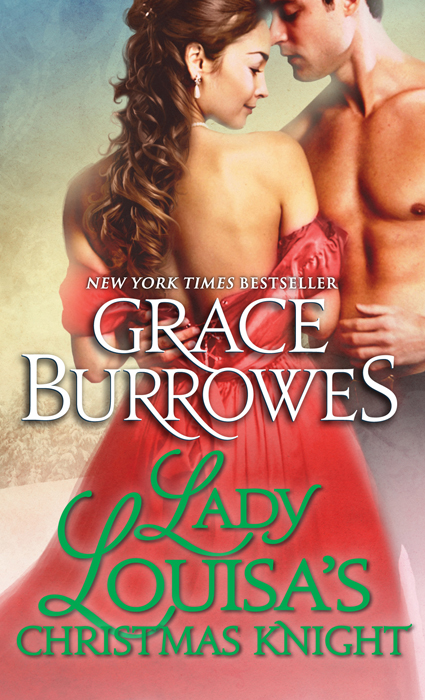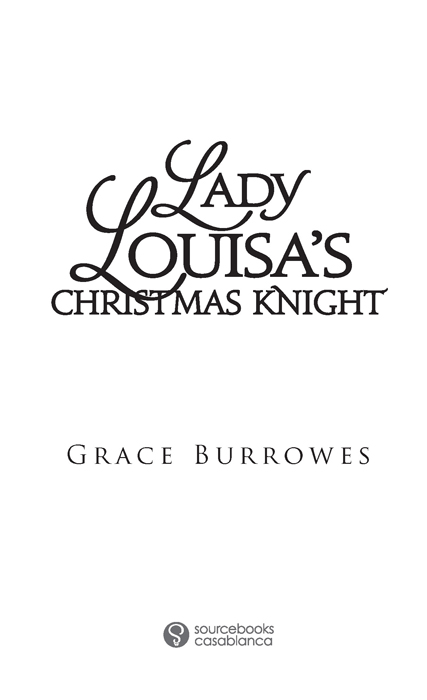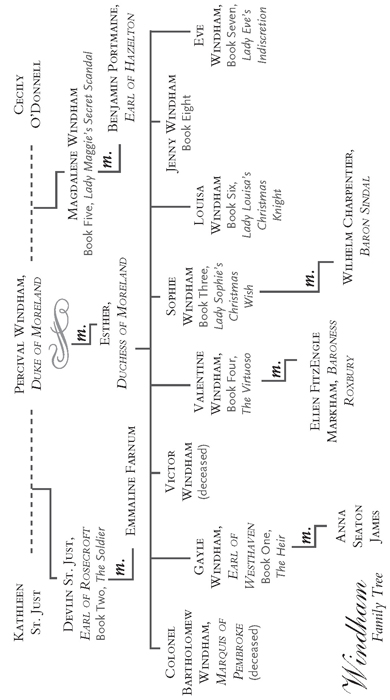Lady Louisa's Christmas Knight
Read Lady Louisa's Christmas Knight Online
Authors: Grace Burrowes



Copyright © 2012 by Grace Burrowes
Cover and internal design © 2012 by Sourcebooks, Inc.
Cover illustration by Anne Cain
Cover photo © Shirley Green Photography, LLC.
Sourcebooks and the colophon are registered trademarks of Sourcebooks, Inc.
All rights reserved. No part of this book may be reproduced in any form or by any electronic or mechanical means including information storage and retrieval systemsâexcept in the case of brief quotations embodied in critical articles or reviewsâwithout permission in writing from its publisher, Sourcebooks, Inc.
The characters and events portrayed in this book are fictitious or are used fictitiously. Any similarity to real persons, living or dead, is purely coincidental and not intended by the author.
Published by Sourcebooks Casablanca, an imprint of Sourcebooks, Inc.
P.O. Box 4410, Naperville, Illinois 60567-4410
(630) 961-3900
FAX: (630) 961-2168
This book is dedicated to my brother Tom, one of those rare people who can say the exact, kind, honest thing you badly needed to hear that you didn't know you needed to hear. Whatever you're dealing with, Tom can bring both humor and wisdom to the situation. Chicky, you were right: the peep-peeps
do
poo poo all over.

Sir Joseph Carrington acquired two boon companions after doing his part to rout the Corsican. Carrington was accounted by no one to be a stupid man, and he understood the comfort of the flaskâhis first source of consolationâto be a dubious variety of friendship.
His second, more sanguine source of comfort, was the Lady Ophelia, whose acquaintance Carrington had made shortly after mustering out. She, of the kind eyes and patient silences, had provided him much wise counsel and companionship, and that she consistently had litters of at least ten piglets both spring and autumn could only endear her to him further.
“I don't see why you should be the one moping.” Sir Joseph scratched the place behind Lady Opie's left ear that made her go calm and quiet beneath his hand. “You may remain here in the country, leading poor Roland on the mating dance, while I must away to London.”
Where Sir Joseph would be the one led on that same blighted dance. Thank God for the enthusiasm of the local hunt. Riding to hounds preserved a man from at least a few weeks of the collective lunacy that was Polite Society as the Yuletide holidays approached.
“I'll be back by Christmas, and perhaps this year Father Christmas will leave me a wife to take my own little dears in hand.”
He took a nip of his flaskâa small nip. Unless he spent hours in the saddle, or hours tramping the woods with his fowling piece, or a snowstorm was approaching, or a cold snap, his leg did not pain him too awfully muchâusually.
“I honestly do not know how you manage it, my dear. Ten piglets, twice a year, for at least as long as I've had the pleasure of your acquaintance.”
She apparently hadn't caught yet this season, though, and winter had arrived. This was worrisome on a level a man not yet drunk didn't examine too closely. Ophelia's fecundity provided reassurance of a fundamental rightness about lifeâreassurance far more substantial than that held by Sir Joseph's flask.
“Get me some piglets, your ladyship.” He switched ears, and his friend tilted her heavy head into his hand. “Get me the kind of babies I can sell at market and grow rich on. Richer. For Christmas, a litter of twelve would do nicely.”
Her record was eleven, and every one of them had lived. That had been two years past, when Sir Joseph had been desperately in need of some kind of positive omen.
A groom whistling the aria “He Shall Feed His Flock” in the manner of a holiday jig let Sir Joseph know that his mount was ready. The lad would not intrude on a private audience between Sir Joseph and Lady Ophelia, not when the groom could abuse poor Handel without mercy instead.
“I'm off. Say a prayer for Reynard.”
With a final pat and a scratch, Sir Joseph left his porcine friend to join his neighbors.
Hunt meets reminded Sir Joseph of the army on parade: all the finery was visually impressive and the great good cheer and bonhomie on both occasions fueled in part by nerves and liquor. The agenda of the day in both cases was ostensibly virtuous, and yet, if all went according to plan, somebody not of the assemblage would die a bloody death.
That the somebody was a foxâmere verminâand outnumbered by the hounds often thirty-couple to one never seemed to bother anyone but Sir Joseph. Even amid the great good cheer of a December hunt meet, he knew better than to share his sympathies for the animal with another human soul.
***
“The Little Season is a great pain in my backside.”
Lady Genevieve Windham hadn't bothered to speak quietly, which her sister Louisa found surprising. True, grumbling to one's sister ought always to be a safe thing to doâLouisa had no use for the Little Season eitherâbut riding in at the back of the third flight, they could come within earshot of their neighbors.
“We've missed all but the last two weeks of it,” Louisa pointed out. “Thank God for Papa and his hunt madness.”
“It's like hunting grouse,” Jenny said, letting her mare drop back farther from the other riders ambling toward the hunt breakfast. “Lent ends, and the husband hunting begins, the mamas beating their charges forward into the waiting guns. I don't know how many more years of this I can take, Louisa.”
“One grows used to much of it.” This was not quite a lie, though Jenny's rare moment of low spirits required the kindness of⦠prevarication, at least.
“You've been at it a little longer than Evie or I, and I should not be complaining to you. I do apologize, Lou.”
Jenny's tone was genuinely contrite for she was truly good, truly considerate, things Louisa had long since stopped aspiring to. Jenny had angelic blond good looks to go with her generally cheerful disposition, in contrast to Louisa's dark hair. In a despairing moment, Her-Grace-their-mama had called Louisa's features bold.
Alas, that was no lie at all.
In the meadow below, other riders were straggling in from the morning's hunt. A group of bobbing feathers caught Louisa's eye: two pheasants, a peacock, and an ostrich plume dyedâmay the sainted bird never learn of itâpink.
And clearly, those feathered hounds were following a scent. Louisa scanned the meadow, her pleasure in the morning's hunt evaporating when she saw their intended prey.
“Jenny, I feel a charitable impulse about to overtake me.” For of all men, Sir Joseph Carrington did not deserve to have the pack descend upon him.
Jenny stopped fiddling with the single tuft of mane unbraided over her mare's withers. “You haven't yielded to an impulse in at least five years, Louisa. Logic is your sole guiding⦠oh, dear.”
“The hounds are running riot,” Louisa muttered. “The poor man can't even see them coming.”
A single rider mounted on a black gelding walked his horse across the meadow on a loose rein, while above and behind him, the four ladies trotted their horses in pursuit.
Louisa had been stifling impulses successfully for eight years, did Jenny but know it. She wasn't going to stifle this one. “Blame my recklessness on the approaching season. Sir Joseph doesn't stand a chance against all four of them at once.”
The prospect of a decorated veteran, a knight of the realm no lessâalso a widower and a
papa
âbeing swarmed by Isobel and her band of marriage-mad minions wasn't to be borne.
Louisa nudged her mare into a canter, cutting over a stream, two logs, and a stile, with Jenny bringing up the rear. Sir Joseph Carrington had served with her brothers Bart and Devlin on the Peninsula, which further assured his place in that class of men whom Louisa respected without question.
He also had no sisters, cousins, or aunties who would rescue him from the fate trotting up behind him. None of the fellows riding in would dare lend assistance either, of course, lest they be drawn into the affray and find themselves dancing with every unmarried lady in the shire at the evening's ball.
Louisa knew what it was to contend with one's fate in isolation, knew the loneliness and exhaustion of it. She suspected Sir Joseph might too, and if she could spare him this small ambush, she would.
“Sir Joseph,” Louisa called as her mare cut in front of the other four riders by two dozen yards. “Good morning! Excellent final run, wasn't it?”
Sir Joseph glanced back toward Louisa, which allowed her to see the moment when he realized his peril. “Lady Louisa, Lady Genevieve. Good morning.”
He didn't quail at the pack closing in on him. He tipped his hat in casual greeting then faced forward again. Devlin had said Sir Joseph was a demon on dispatchâbrave and unflinching. His battle instincts were apparently still in working order.
From the corner of Louisa's eye, she saw Isobel Horton of the pink plume glowering a sentiment not at all in keeping with the approaching Yule season.
Happy
Christmas
to
you
too, Isobel.
“Jenny, weren't you looking for some help with setting up the hunt breakfast?”
Jenny's smile as she came up on Sir Joseph's off side could have graced a saint. “So, I was. Sir Joseph, if you'll excuse me?” She turned her mare. “Oh, ladies! Isobel, Elspeth, I am ever so glad to see you. And Isobel, that is the most cunning hat⦔
Sir Joseph watched this maneuver, a hint of a smile hovering on his dark features. “Neatly done, Lady Louisa, and please thank Lady Genevieve when next you see her.”
Louisa inclined her head, lest he catch
her
smiling.
Carrington's voice did not lie easily in the ear. His bass-baritone growl lacked the plummy vowels and aristocratic musicality of either public school or university. Louisa liked this about him, liked that he wasn't all pretty manners and mincing vocabulary. She liked even more that he knew exactly what had just transpired and didn't pretend otherwise.
“Care for a nip?” Sir Joseph held out a silver flask engraved with an unfurled rose bud. The thing looked incongruously small and elegant in his black-gloved hand. “And in case you're wondering, there's a combination of rum and hazelnut liqueur in here. It warms the bones.”
She accepted his flask, appreciating the gesture, though he likely would have made the same offer to Isobel or Jenny. In the hunt field, there were frequent stops to “check one's tack” or let the horses blow while the hounds were cast. When the weather was brisk, these pauses invariably involved a tot of whatever was in one's flask. Even the ladies were permitted a discreet nipâLouisa had drained her flask before the second run.
“That is⦠good.” Bracing, even. The brew itself was warmed by Sir Joseph's body heat, giving the spirits a mellow fire when imbibed. Louisa took a second sip and passed the flask back.
A very agreeable combination, indeed.
Sir Joseph helped himself to a swallow, and the flask disappeared into an inner pocket of his hunt coat. “I admit to some puzzlement, my lady: you are a bruising rider, well able to keep up with the hounds, even to leading the first flight, and yet you lurk at the back with the inebriates and the timid. You have piqued my curiosity.”
Piquing a man's curiosity was not a good thing in Louisa's experience, though the part about being a bruising rider was lovely coming from a former cavalry officer.
“I keep my sister company.”
“Ah.”
Men had the ability to mock with a single syllable. Certain men. Louisa's five brothers had been born with this ability, and yet, she didn't think Sir Joseph meant to make fun of her.
“Lady Genevieve rides quite well,” Louisa admitted. A good lie was based as much as possible on truth. Her brothers had taught her that too. “She is softhearted though, and does not like to risk being in at the kill.”
“I see.” The smile was back, very subtly. Louisa wanted to stare at the man to see if that smile ever broke forth into the genuine article.
Staring would not do, however. Louisa gained a moment's pause to think up another conversational gambit when Sir Joseph's horse began to passage. The animal was far from dainty, and yet, when it collected itself like that, quarters lowering, trot steps becoming elevated and cadenced, man and beast each looked elegant and elementally⦠attractive.
“Enough of this nonsense. Settle, you.”
When Carrington spoke to his horse, his voice was differentâpurring and affectionate, not growling. The horse relaxed back into a walk while the rider stroked a hand over its mane.
“He is quite an athlete, Sir Joseph, and yet I noticed you also avoid the first flight.”
“Sonnet is anxious for home now. He and I are alike in that regardâmost comfortable among familiar surroundings. To reply to your observation, Lady Louisa, all I can say is that war has changed the way I view blood sport, to the point where I find the term an oxymoron. Will you be going up to Town before Christmas?”
Louisa knew what oxymoron meant, along with onomatopoeia, synecdoche, and anthropomorphismâfor starters. Perfect gentleman was an oxymoron.
Perfect
lady
was
too.
“For the next two weeks, my sisters and I will remove to Mayfair with Their Graces.”
“Do I surmise that this is
not
a cause for rejoicing?”
Louisa turned her head to regard him and found his gaze was seriousâtoo serious? “Are you teasing me, Sir Joseph?” Her brothersâbrave men eachâused to tease her, before her schoolgirl arrogance had taken one of their dares to a disastrous conclusion. She did not miss their nonsense whatsoever.
Sir Joseph leaned a little closer in his saddle and glanced around, as if imparting a great confidence. “I am commiserating, I think.”
He straightened, swiveled his eyes front, and kept speaking. “I go up to Town in spring and autumn and each time wonder if I'm not becoming more like my great-uncle Sixtus. For the last forty years of his life, he never once set foot in London, and each decade, he professed to be happier than the one previous.”
“This would be the fellow from whom you inherited your property?”
“My farm.”
His
farm
was thousands of acres. According to His Grace, they were very good acres, and Sir Joseph took excellent care of them. Lucky man, to be able to rusticate where one could see stars at night and go for a pounding gallop come morning.
Ahead of them now, Jenny and her companions were chattering back and forth, no doubt weaving a conversation about watercress sandwiches or something equally riveting.
“London isn't so bad,” Louisa said. London was tedious, crowded, and full of people with a bewildering ability to talk much, say little, and apparently enjoy themselves in the process. “Christmas will see us back out to Morelands in a very short while.”
“Two weeks can be an eternity.”
He said this with something like resignation. Louisa saw him put his reins in one hand and fish inside his hunt coat for his flask, though he neither withdrew it nor imbibed any more of his personal brewâmore's the pity. She could have used another tot. Two weeks was, after all, one million two hundred nine thousand six hundred seconds.